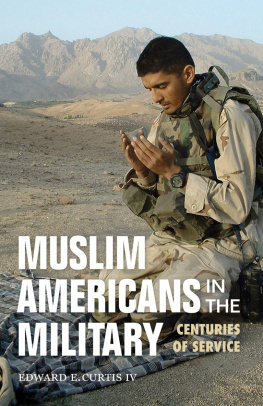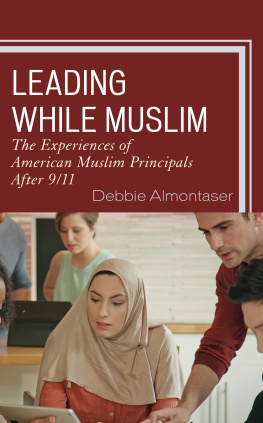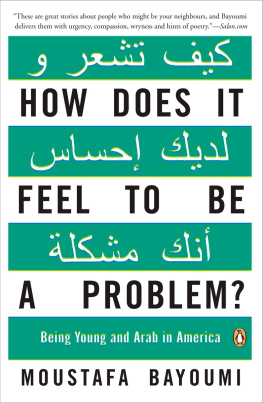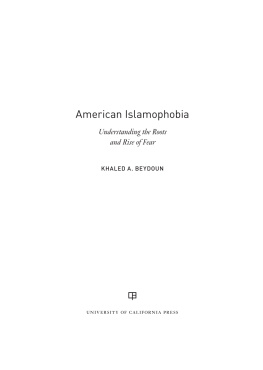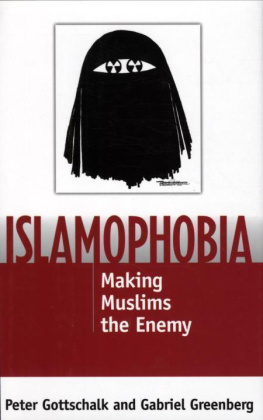Library of Congress Cataloging in Publication Number: 2017054953
A British Cataloging-in-Publication record for this book is available from the British Library.
Copyright 2018 by Saher Selod
All rights reserved
No part of this book may be reproduced or utilized in any form or by any means, electronic or mechanical, or by any information storage and retrieval system, without written permission from the publisher. Please contact Rutgers University Press, 106 Somerset Street, New Brunswick, NJ 08901. The only exception to this prohibition is fair use as defined by U.S. copyright law.
www.rutgersuniversitypress.org
For my parents, my husband, and my daughter
Racialized Surveillance in the War on Terror
I vividly remember the morning of 9/11. I was working at the Chicago Reader, a weekly alternative paper, compiling movie and theater listings. That morning, a coworker and friend called me as I was heading out to work and asked me if I was going to stay home that day. When I asked why, he told me to turn on the television. I remember seeing endless footage of the planes hitting the World Trade Center and the towers collapsing. I also recall my friend begging me to come to his house where he felt he could keep me safe. At the time, I lived alone in a condo in a young, predominantly white, professional neighborhood. This friend was worried for my safety because I am a Pakistani Muslim American. Within hours of the attacks, the identities of the perpetrators were revealed: all Muslim. Even though the terrorists came from Saudi Arabia, the United Arab Emirates, Egypt, and Lebanon, my friend feared I would be associated with these men because of a shared religious identity. I called my editor that morning, who told me I could stay home if I needed to but that the paper would still come out on deadline. I knew no one else could do my job, so I decided to go into work. As I was riding in a cab heading downtown, I was confronted with the eerie sight of swarms of people trying to catch cabs and buses in the opposite direction. When I got to work, the silence there was chilling. The only sound was a television brought into the break room that droned on all day. I heard Peter Jennings, a Canadian American television reporter for ABC, urging Americans to refrain from expressing their anger toward Muslims or Middle Easterners. While it brought some comfort to hear him say this, it also instilled fear in me because I knew Muslims would have to brace themselves for the impending backlash.
For weeks after the attack, I felt a range of emotions: I cried as I watched the victims families grieving on television for the loss of their loved ones; I hated the attackers for the innocent lives they took; I resented them for the lasting impact this assault would have on the lives of many blameless people who would be forced to unjustly accept responsibility for the attack. And I was scared. I was scared for many reasons. I was terrified there would be another attack. I was afraid of how strangers would treat me if they knew I was a Muslim. For a while, I refrained from making eye contact with strangers on the street out of a fear of seeing any anger and hatred toward me because I am not white and am often questioned about my status as an American. I was also fearful of what my friends responses would be to the attacks. Although the majority of the people I know have always been open-minded about religious difference, I knew any suppressed religious bigotry would surface after a terrorist attack of this scope. I found myself anxious about the safety of my parents, who live in Texas. My mother wears the hijab, and both my parents are extremely active members of the mosque in the town they live in. I knew the mosque would be a target for anti-Muslim anger, and I worried they could be in danger. What I experienced for the next few years after that horrific day was what piqued my interest in the experiences of Muslim Americans.
The fears I had immediately after September 11th in many ways have come to fruition. Anytime there is another terrorist attack, I worry that the response from the public and the government will be worse than the last one. The experiences of Muslim Americans have in many ways gotten worse in the fifteen years since 9/11. That date set in motion a series of laws and policies that would forever change the American way of life I once knew.
For the Muslim Americans who remember life before 9/11, that event brought a new type of contestation and questioning of their national identity because of their religion. South Asian Muslim immigrants and their offspring have historically been denied complete access to an American identity (Kibria 1998; Purkayastha 2005; Dhingra 2007), but because the association of Islam with terror has been structured into laws and policies that dealt with national security after 9/11, their experiences changed.
Of course, it would be a mistake to assume Muslims experiences since 9/11 have been universal. Factors such as gender, skin tone, and accent also play a crucial role in how Muslim Americans experience everyday life in a nation engaged in the War on Terror.
My father was one of the thousands of Muslim Americans who had to endure questions from the FBI about his patriotism and loyalty to the United States. Shortly after the attacks, my father was deboarding a plane after a work trip to Dubai, where he attended a medical conference. As he exited the plane, TSA agents stopped him and escorted him to a private room where he was interrogated about his travels. This was an experience he had not encountered prior to 9/11. The agents knew information about my fathers travel, such as what he bought while he was there. This made my dad feel that he was being watched and monitored by the government. My father is a practicing and devout Muslim who has always been proud of his status as an American citizen. Like so many other migrant Muslims, he moved to the United States in hope of a better life for himself and his family. For my father, becoming a citizen was a choice that he took so much pride in. But as the years have passed since 9/11, it has become increasingly apparent that because my father is a Muslim, he is vulnerable to being seen as un-American and a potential threat to national security. A few weeks after 9/11, my father began wearing an American flag pin on his coat lapel, something he still wears, in case anyone might question his loyalty to the United States.
The hijab, a headscarf many Muslim women wear to demonstrate their religiosity, marks my mother instantly as a Muslim in the publics eye. Shortly after 9/11, a gas station attendant approached my mother while she was filling up her car with gas. My parents put a sticker of the American flag on all of their cars after the terrorist attacks to show that they too were patriotic citizens. The attendant pointed to the sticker and said, That isnt going to save you. He continued to verbally accost her because she is Muslim. My mother quickly fled the gas station, fearing for her safety. She was not used to strange men verbally accosting her in public spaces. These incidents are just a few of the many encounters my parents have had with the government and their fellow private citizens over the last fifteen years.


